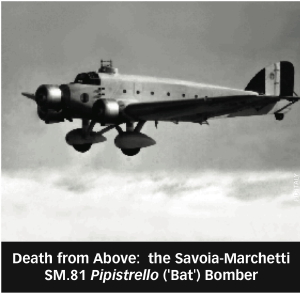Over the last few weeks, I’ve been writing about the Italian campaign in Ethiopia (1935–36), one of the many wars between the two world wars. We often speak of the “interwar” period, but in fact it was chock full of conflict: the Russo-Polish War, the Chaco War between Bolivia and Paraguay, the Japanese invasion of China, and many more. While it may have been interwar, it clearly wasn’t anything approaching “peace.”
The point I’ve been making is that analysts of the day took the Italian war very seriously—far more seriously than we do today. While anyone conversant in the history of World War II tends to laugh at the Italian armed forces, they were actually the first in history to carry out a mechanized campaign, with tanks, trucks, and aircraft working together in relative harmony. The Italians ended a long-running debate about whether such a thing was even possible, showing the traditionalists, conservative nay-sayers, and horse cavalry fanatics that a new age had dawned in military affairs, and that the future of warfare belonged to the machine. The Italians attacked with tanks, used ground-support aircraft to help break through Ethiopian defenses and harry the enemy as he attempted to retreat, and employed air transport assets to supply their forward elements and to leapfrog their headquarters formations forward hundreds of miles at a bound. All in all, it was an admirable achievement, and any standard military history should applaud it. If there’s one thing we historians love, it is progress, and this campaign seemed to be a living embodiment of the concept.
But there is one last factor we have to discuss, in order to treat this campaign as seriously as it deserves. We need to delve into the morality of it all. As a historian who lives in the world of logic and cause and effect, I am not at all comfortable handing down condemnations. A wise man once said, “Let him who is without sin cast the first stone,” and I try to keep that admonition in mind at all times.
Still, this was an ugly campaign, and the Italians arguably crossed a series of lines in conducting it. Machine guns and heavy artillery against poorly armed feudal levies? Strafing and bombing runs against an enemy almost completely devoid of antiarcraft weapons? It’s easy enough to answer with the stock phrase, “fortunes of war.” After all, more sophisticated forces have been winning battles for centuries, slaughtering their adversaries on the process. Nothing to see here, move along. Mussolini’s nineteen-year-old son Vittorio, an Italian air force pilot, even called it a “magnificent sport.” He was nineteen and feeling the adrenaline, so no one should treat him too harshly. But what kind of society celebrates such words?
 And it gets worse. The Italians repeatedly dropped poison gas on the Ethiopians. It was something that later European air forces in World War II would refrain from doing, almost certainly from fear of reprisal. But the Italians had no need to fear Ethiopia on this score. Haile Selassie had neither the scientific base nor the delivery systems to hit the enemy in kind, and the Italians knew it. As to Ethiopian preparation for chemical warfare—gas masks, protective clothing, decontamination procedures—we can sum it up in a single word: zero.
And it gets worse. The Italians repeatedly dropped poison gas on the Ethiopians. It was something that later European air forces in World War II would refrain from doing, almost certainly from fear of reprisal. But the Italians had no need to fear Ethiopia on this score. Haile Selassie had neither the scientific base nor the delivery systems to hit the enemy in kind, and the Italians knew it. As to Ethiopian preparation for chemical warfare—gas masks, protective clothing, decontamination procedures—we can sum it up in a single word: zero.
Put yourself into the shoes of an Ethiopian soldier. You are a young man who has answered the call of your local Ras and marched out to defend the empire. The Italians don’t scare you. You have been hearing the tales for years about the last time the Italians invaded. How your fathers and grandfathers smashed them at Adoua. You march off confidently, ready to shine in the eyes of your family and loved ones. Then, even before you have a chance to prove your valor, a small flight of Italian aircraft appears overhead. A small stick of bombs dropped, but no real explosions. Stillness at first. Then a whiff of something strange. A sickly sweet smell. What is happening? A sudden panic—you can’t breathe! What are your last words as you die a horrible, choking death? If you’re like most young soldiers, you probably cry out for your mother.
Let me ask my readers. Who is more admirable? The well-trained technician raining down chemical death on a hapless enemy? Or a young boy bravely trying to defend his own home?
I’ll tell you how I feel, and you are free to disagree. I was born an Italian American on the west side of Cleveland, Ohio, in the midst of an ethnic melting pot of Irish, Italians, and Hispanics. I don’t apologize for who I am. I love being Italian.
But at the same time, I’m a historian, and the Ethiopian Campaign can’t help but make me sick. Invasion. Mechanized slaughter. Air attack. Poison gas. Hell, after the victory, Italian occupation troops had orders to round up and shoot as many Coptic Christian priests as possible, in order to reduce the possible of resistance amongst the recently conquered Ethiopian population.
We often treat Mussolini as some sort of clown. He was hardly that. The historical record shows that he was deadly serious—as serious, in his own way, as Hitler. And that anonymous Ethiopian warrior fighting to defend his family? I have a word for him, an ancient and honorable word: hero.
For the latest in military history from World War II‘s sister publications visit HistoryNet.com.




